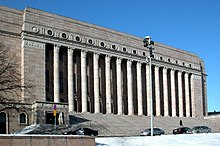

Johan Sigfrid Sirén (27 May 1889 – 5 March 1961) was a Finnish architect. He is best known for Eduskuntatalo, which is where the Parliament of Finland meets.
Career
Sirén was born in 1889 in Ylihärmä. [1] In 1907, he graduated from high school and started his studies at the Helsinki University of Technology. [1] After receiving his diploma in 1913, Sirén worked for Jung & Fabritius until 1917. [1] In 1918, he founded an office with Kaarlo Borg and Urho Åberg. [1] In 1924, they won a contest for the design of Eduskuntatalo, the Parliament House of Finland. [1] The three soon parted ways and Sirén continued work on the Eduskuntatalo alone. [1] During the construction period from 1926 to 1931, he acted as a supervisor. [1]
Sirén went on to hold his own office, and his later work included the expansion of the main building of the University of Helsinki. [1] In 1931, Sirén was also appointed a professor of architecture at the Helsinki University of Technology. [1] He retired from the position in 1957, and died in Helsinki in 1961. [1] He is buried in the Hietaniemi Cemetery in Helsinki. [2]
Sirén's son Heikki Siren was also a renowned architect, as was his daughter-in-law Kaija Siren.
References
- ^ a b c d e f g h i j "J.S. Sirén". Museum of Finnish Architecture (in Finnish). Archived from the original on 31 October 2010. Retrieved 19 September 2011.
- ^ "Hietaniemen hautausmaa – merkittäviä vainajia" (PDF). Helsingin seurakuntayhtymä. Retrieved 27 August 2016.


Johan Sigfrid Sirén (27 May 1889 – 5 March 1961) was a Finnish architect. He is best known for Eduskuntatalo, which is where the Parliament of Finland meets.
Career
Sirén was born in 1889 in Ylihärmä. [1] In 1907, he graduated from high school and started his studies at the Helsinki University of Technology. [1] After receiving his diploma in 1913, Sirén worked for Jung & Fabritius until 1917. [1] In 1918, he founded an office with Kaarlo Borg and Urho Åberg. [1] In 1924, they won a contest for the design of Eduskuntatalo, the Parliament House of Finland. [1] The three soon parted ways and Sirén continued work on the Eduskuntatalo alone. [1] During the construction period from 1926 to 1931, he acted as a supervisor. [1]
Sirén went on to hold his own office, and his later work included the expansion of the main building of the University of Helsinki. [1] In 1931, Sirén was also appointed a professor of architecture at the Helsinki University of Technology. [1] He retired from the position in 1957, and died in Helsinki in 1961. [1] He is buried in the Hietaniemi Cemetery in Helsinki. [2]
Sirén's son Heikki Siren was also a renowned architect, as was his daughter-in-law Kaija Siren.
References
- ^ a b c d e f g h i j "J.S. Sirén". Museum of Finnish Architecture (in Finnish). Archived from the original on 31 October 2010. Retrieved 19 September 2011.
- ^ "Hietaniemen hautausmaa – merkittäviä vainajia" (PDF). Helsingin seurakuntayhtymä. Retrieved 27 August 2016.